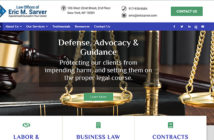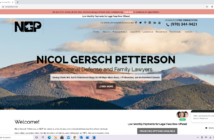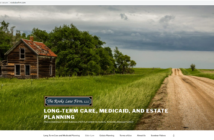For this Philadelphia injury firm, TV advertising worked for awhile and purchased leads bombed. Now the firm’s marketing focus is on its radio show, mobile ads, and community relations.
Silvers, Langsam & Weitzman, a six-attorney personal-injury firm in Philadelphia, made a name for itself around town with splashy advertising on everything from billboards and the sides of buses to local television broadcasts. Those ads featured the trademarked slogan captured in the firm web site’s domain name: MyPhillyLawyer.com.
The catchy campaign was so successful, says managing partner Dean Weitzman, who has overseen the firm’s marketing efforts, that it spawned numerous copycats – ranging from My Philly Criminal Lawyer to My Philly Plumber – diluting the effectiveness of Silvers, Langsam & Weitzman’s ads. That is one of the reasons why the firm has stepped back from TV advertising, at least for now, in favor of cheaper strategies including geo-targeted ads delivered to mobile devices.
A weekly call-in radio show has also proven to be a highly effective way to build connections with potential clients. Above all, Weitzman says he has learned over the years, through trial and error with a wide array of law-firm marketing practices, that perhaps nothing is more effective than mingling socially with ordinary citizens after hours. “Join a bowling league,” he says. “You will probably make a fortune.”
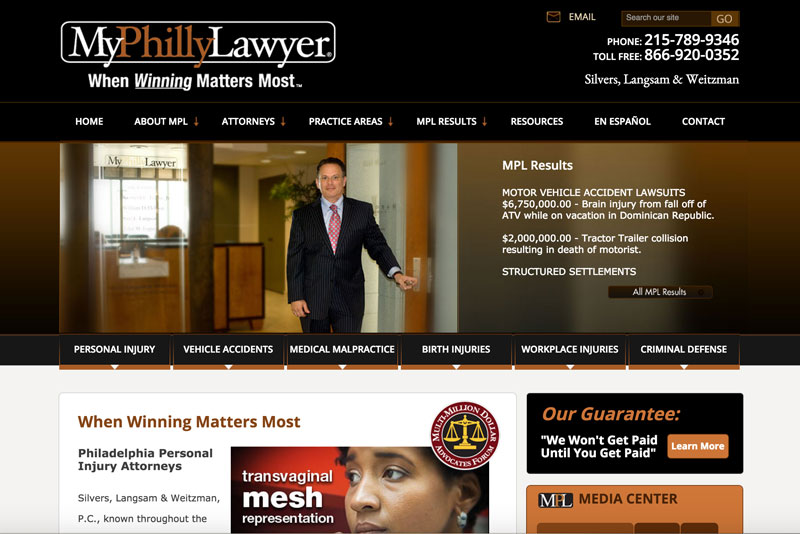
Out of TV, Into Digital and Radio
The TV commercials served the firm well for awhile, says Weitzman, who was adamant that he did not want to be a “talking head in front of a wall of books.” So they were expensively produced, showing him striding through the city where, a voice-over explained, he has lived all his life. He learned over time that running commercials in the evening, for instance during Philadelphia Phillies baseball games, was worth it, even though the cost was more than 10 times higher than advertising on a daytime television because Phillies fans were far more likely to have legitimate claims than viewers of shows like Jerry Springer.
His firm might bring the commercials back at some point. But would he recommend that other small law firms or solo practitioners try TV advertising? The short answer is “no.” His longer answer is, “Maybe you work yourself up to that, if you’re in a small marketplace where there’s not that much competition and maybe it’s not that expensive. But I don’t think a small practitioner in a major city could make a dent with TV advertising without a huge budget. Remember that the personal injury or medical malpractice practice case coming through the door today will not generate a fee for 18 or 24 month. So you would have to have the wherewithal to advertise for a couple of years before you would see any payoff. That’s a difficult thing to do, especially in a large marketplace where TV time is so expensive,” Weitzman says.
In Philadelphia, the proliferation of other businesses and law practices that co-opted the slogan he coined helped push his firm off of TV, Weitzman says. “I guess I didn’t realize at the time that it was such a good idea because I didn’t try to secure the intellectual property rights to My Philly Blank. I’m flattered [by the copycats], but it also makes it more challenging to stand out in the marketplace,” Weitzman says.
Over the years, Silvers, Langsam & Weitzman has tested a wide array of other marketing practices. “We have done billboards for quite a while. We did exterior buses. We have done interior buses including the interior ceilings of buses,” he says. “But right now, digital is a major component of our advertising. What I mean by that is the ads that pop up when you use an app on your phone. You can geo-target those ads. I have geo-targeted ads around the 10 major hospitals in the Philadelphia area. So when people are in or around those hospitals and they are using their phone, our ads will come up.”
That has proven to be effective. As Weitzman explains, unlike someone selling hamburgers, “I cannot create a desire for you to need a lawyer. I have to be in the top of your mind at the moment you need our services. When you have had an accident or a potential medical malpractice case, that’s when you need me and that’s when I need to be top of mind. I geo-target our ads in the hope that if somebody is visiting those hospitals because they or a family member have had an accident, my ad will appear on their phone.”
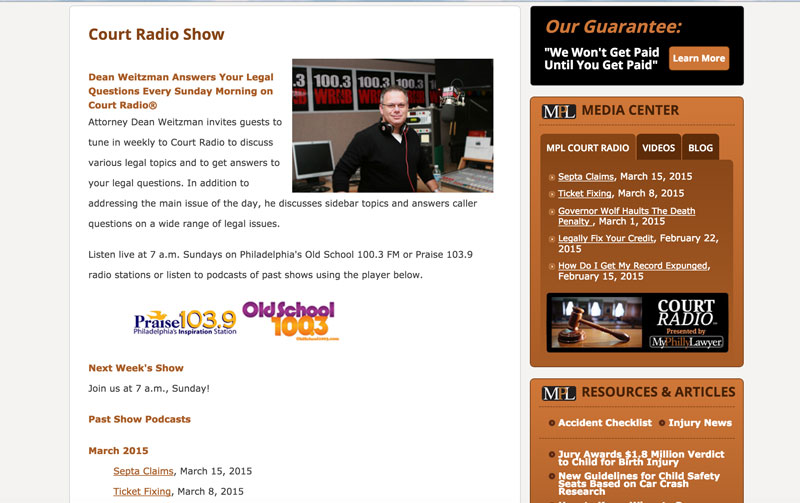
Call-In Show Is Firm’s Best Marketing Platform
Weitzman is even more enthusiastic about another platform: radio. For the past five years, he has been host of an hour-long call-in talk show that is simulcast every Sunday morning on three FM stations that reach about 18,000 listeners in the Philadelphia area. “That is rewarding because it allows me to provide information to the general public while also establishing a relationship with people who might become my clients one day. That’s where I have found a comfort zone for advertising,” he says.
Weitzman got his foot in the door by initially being a paid sponsor of a radio show and making occasional guest appearances. Since then, “the project has really taken on a life of its own.” He did it by the seat of his pants at first but now has a producer. “We meet before each show and we come up with some hot-button topics to discuss or we decide on a focus. But I am also guided by the listeners and their questions. We have five or six lines and now, when we open the show at 7 a.m., they are immediately filled up. We have a very strong, active audience, and it is the source of a lot of business for our office,” Weitzman says.
Fear of getting sued by a disgruntled listener who believes he gave bad legal advice over the radio “is not a major concern, but I would be lying if I didn’t say I have to think about that,” says Weitzman. Nothing of the sort has happened in five years. “I am careful to give correct advice. I will also sometimes explain to listeners that based on what I have heard, I can only give a general response. A more specific answer for their particular case may require reviewing documents, talking to witnesses, or what have you. I will tell them that they need to make an appointment to come in so that I can review their matter on a more personal level.”
Weitzman adds, “I don’t particularly use the radio to grab clients. I am really just giving information and letting listeners know what their rights and limitations are so they can plan accordingly. It is up to them to take that next step. A lot of times, we direct people to file a small claims complaint or a municipal court complaint on their own because their case simply isn’t large enough to warrant retaining an attorney. In those cases, I try to give enough information for them to handle the matter on their own. A common thread is that I try to give them honest information, and it is not always what they want to hear.”
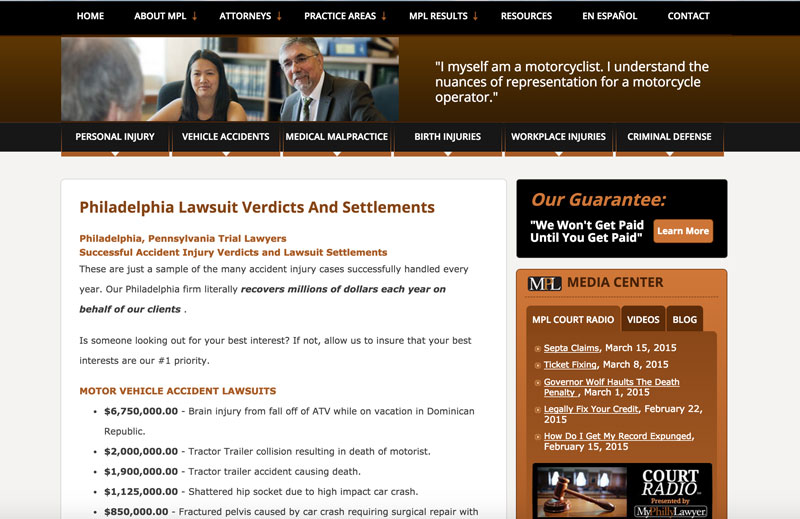
Lead-Generation Services Have Mostly Been a Bust
Weitzman has also experimented with lead generation services, “where you pay a third-party to send you referrals of potential clients who they have captured in their net.” It has worked reasonably well with mass torts including transvaginal mesh litigation. That’s because “if you have transvaginal mesh, you know it, and if you are having problems with that transvaginal mesh, you know that, too. So you probably have a case.”
In the general personal injury context, on the other had, “lead gen stinks,” Weitzman says. “I have done it for the better part of a year and the quality of those clients is horrific. They have hardly any injuries, or they had an accident but waited way too long to pursue it. They are the dregs of personal injury clients, which shouldn’t be a surprise if you think about it.” Personal injury clients with legitimate cases ask family members or friends for a recommendation, or call a lawyer they have heard about over the years. They don’t fill out a form on Findlaw and wait to be referred to an attorney they have never heard of, he says.
“I have made the decision that lead generation in medical malpractice or personal injury law doesn’t work. But I had to spend some money to come to that determination,” says Weitzman. “That shows I don’t always make the right decisions. But you have to be willing to spend money and invest energy in trying some new things to figure out whether they work or not.” You also have to be persistent, Weitzman adds. “You can’t just drop one bomb and hope it is going to do anything.”
For New Attorneys, Low-Cost Social Media May Be Best Bet
For lawyers just starting out, Weitzman has several suggestions. “I would start with the least expensive, grassroots social media and I would grow that until I had a following, and then maybe I would try radio and outdoor advertising. But whatever you try, don’t forget that it’s a process, because I believe you have to build a relationship with the person who one day may trust you to help them with their very important matter, and that trust doesn’t happen overnight,” Weitzman says.
“You don’t have to do pay-per-click. You don’t have to do Facebook advertising or any of that. If you have a large enough community that you have cultivated, and they find value in what you are contributing on a daily basis, and if you are consistent, that is how you are going to get clients, and you do not have to spend a nickel of your money. That is where I think young attorneys need to focus their efforts at first,” Weitzman adds.
Weitzman has used social media primarily to connect with groups of personal injury lawyers around the country. “I try to post something on a regular basis that might help them and that will demonstrate that I am a competent attorney in this marketplace. If a lawyer in one of those groups ever has a client in the Philadelphia marketplace and the lawyer is in San Diego, if they know that I treat people with respect and am honest and deliver a good product, they might refer the client to me. In fact, I have gotten clients that way. I just think you have to be honest.”
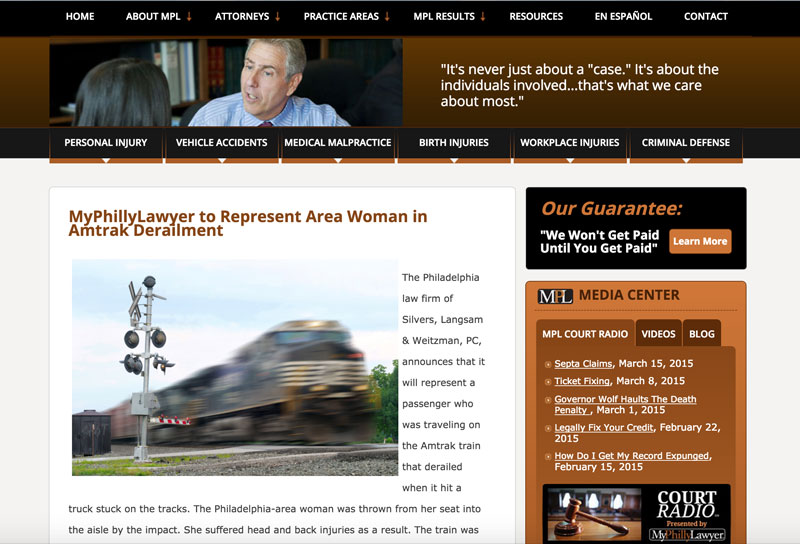
Making Connections with Community Groups
To make connections with ordinary citizens in Philadelphia, Silvers, Langsam & Weitzman has done a variety of sponsorships over the years. For instance, the firm has sponsored a team in a youth basketball league. The firm also brought in kids who were on a mock trial team at an underprivileged high school to work as summer interns.
Weitzman has found that to be especially gratifying because he benefited from a similar opportunity when he won a citizenship award as a Boy Scout and was paired with a member of the business community. “I remember people taking an interest in me and helping me get along from childhood to adulthood. I try to do the same thing for other people. If that helps get my name out, I guess that’s a secondary benefit,” Weitzman says.
Other social connections can be invaluable for bringing in business, says Weitzman, who cites a hobby of his as a case in point. He has gotten together with a group of friends for a monthly card game for more than 25 years. “I have probably made $1 million around that card table, because these are guys who aren’t lawyers, and when they or their family members or friends have auto accidents or slip and fall accidents or medical practice cases, they send them to me. So the more you can do to be in proximity to folks who might need your services, the better off you will be,” Weitzman says. “It’s not rocket science. I have a service I provide, and I let people know it. They get to know me. They realize that I am competent and good at what I do, and the cases come.”

